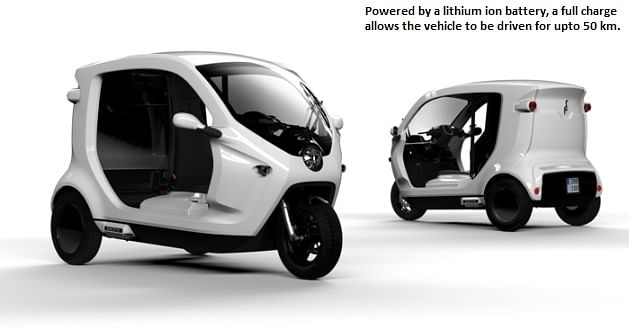Swedish electric three-wheeler brand Zbee enters India
About 100 Zbee commercial vehicles will be locally assembled in India at Faridabad in Haryana every month. Half of the Zbee drivers will be women.
Sweden’s Clean Motion launched its Zbee electric commercial vehicle in India on February 10, flagging off its commercial operation this evening from DLF CyberHub in Gurgaon. As part of a cluster, 25 Zbees will provide last-mile connectivity from the CyberHub to nearby offices of DLF Cyber City and later on to the metro stations. The zero-emission Zbee is currently imported as a CKD kit.
Under its pact with DLF, Zbees will function from various retail formats in Delhi-NCR. Homologated by ICAT Manesar and certified by government authorities as an electric vehicle with a registered numberplate, about 100 Zbees per month will be locally assembled at Faridabad; local manufacturing is being explored at a later stage. The Zbee is currently sold in Sweden and Indonesia and India will be the third country on its radar.
Made from a fibre reinforced plastic body, the lightweight EV weighs around 270kg enabling it to strike a balance between its light body structure and safety requirements. The Zbee comes with an advanced lithium ion battery; a full charge allows it to be driven for upto 50km. Recharging takes an hour, says Clean Motion. Later a rapid charging device, which enables a recharge within 30 minutes, will be introduced. The company claims that three Zbees fit into a single parking lot. Operating cost is 30 percent of the cost of a fossil fuel vehicle. It can seat two passengers and the driver and has a top speed of 45kph. In addition, it comes with a parking brake to prevent theft.
“Fossil fuel-run vehicles have contributed significantly in adding to the carbon footprint and emissions in our environment. To combat this, we started developing technology which is lean, clean and safe and can be a potential alternative transport solution. This led to the Zbee,” says Goran Folkesson, CEO of Clean Motion.

Expanding footprints in India
Clean Motion has so far invested over $1 million (Rs 6.3 crore) in its Indian operations and plans to invest another $10 million (Rs 63 crore) by 2017 for expanding its reach across India. An upcoming IPO to raise a capital of $5 million this April will go towards setting up a manufacturing facility for the Zbee in the vicinity of Faridabad, confirms Folkesson.
The target is to achieve about 70 percent localisation of parts over the next 6-8 months so as to bring down the production cost by 2017. At present the Zbee costs Rs 5 lakh and with indigenisation the product cost is expected to down by 50 percent within a year according to Anil Arora, country head of Clean Motion India.
The Faridabad assembly facility can roll out around 3,000-5,000 units annually and a new modern manufacturing plant is expected to have an annual production capacity of 5,000 units as well. The target is to set up multiple micro factories for producing the Zbee in close proximity to its customers as it expands across the country.
At a rough estimate, each micro factory will require an area of 500-1000 square metres and involve an investment of Rs 4 crore producing 5,000 units annually. Franchisees will be tasked with marketing the Zbee.
Interestingly, at present, many components like the windscreen and tyres are locally procured while the lithium ion battery will be soon indigenised by a Korean player in India. Clean Motion is then looking to locally manufacture the Zbee body in India to give a leg up to the Make in India vision.
Clean Motion is also closely working with Delhi’s integrated Multi-Modal Transit System and other organisations for training drivers. About half of the Zbee drivers will be women. Through the India-Sweden Joint Working Group for Smart Cities, Clean Motion is now tapping the potential of leveraging its Zbees in the initial 20 smart cities planned by the Union government. “We hope we can closely work with FAME –Faster Adoption and Manufacturing of Hybrid and Electric Vehicles in India – as part of the National Electric Mobility Mission Plan and explore the option of offering incentives on adoption of commercial EVs,” says Arora.
RELATED ARTICLES
Cosmo First diversifies into paint protection film and ceramic coatings
The Aurangabad, Maharashtra-based packaging materials supplier is leveraging its competencies in plastic films and speci...
JSW MG Motor India confident of selling 1,000 M9 electric MPVs in first year
The 5.2-metre-long, seven-seater luxury electric MPV, which will be locally assembled at the Halol plant in Gujarat, wil...
Modern Automotives targets 25% CAGR in forged components by FY2031, diversifies into e-3Ws
The Tier-1 component supplier of forged components such as connecting rods, crankshafts, tie-rods, and fork bridges to l...






 By Shobha Mathur
By Shobha Mathur
 10 Feb 2016
10 Feb 2016
 49037 Views
49037 Views












 Autocar Professional Bureau
Autocar Professional Bureau




